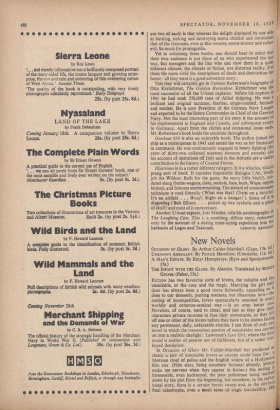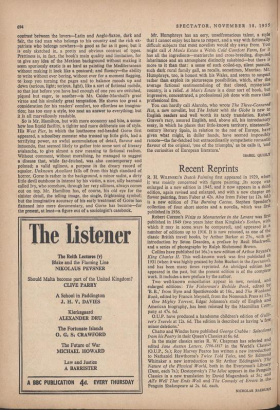New Novels
THE INFANT WITH THE GLOBE. By Alarc6n. Translated by Robert Graves. (Faber, 15s.) FICTION has two favourite sorts of lovers, the suitable and the unsuitable, or the cosy and the tragic. Marrying the girl next door has always been a good move fictionally, appealing as,_It does to our domestic, purring instincts; but disastrous love—We mating of incompatibles, lovers spectacularly unsuited in every worldly and common-sensical way — is an even better one• Novelists, of course, tend to cheat, and just as they give characters private incomes to free their movements, so they off one or other of the lovers before they have to be shown facing any permanent, daily, unfaceable routine. 1 can think of only novel in which the tremendous passion of unsuitables was carrte9 on into a realistic daylight : Lawrence's Lost Girl, where the finni mood is neither of passion nor of fulfilment, but of a rather 10/- keyed desolation. In Occasion of Glory Mr. Calder-Marshall has produced as classic a pair of unsuitable lovers as anyone could hope for: a, Mexican chief of police and the English widow of a Hollywnnu film star. (Film stars, being somehow fictional already, alwa) .s make me nervous when they appear in fiction.) His ending foreseeable, even hackneyed, the poor policeman being marken down by the plot from the beginning, but somehow, in the rather banal story, there is a certain heroic sweep and, in the obvi0i?s. final catastrophe, even a small sense of tragic inevitability. 1-11'
contrast between the lovers—Latin and Anglo-Saxon, dark and fair, the tied man who belongs to his country and the rich ex- patriate who belongs nowhere—is good as far as it goes; but it is only sketched in, a pretty and obvious contrast of types. Prettiness is, in fact, the book's main quality and limitation, for to give any idea of the Mexican background without making it seem spuriously exotic is as bard as painting the Mediterranean without making it look like a postcard; and fluency—the ability to write without ever boring, without ever for a moment flagging, to keep you turning the pages and to balance moods up and down (serious, light; serious, light), like a sort of fictional mobile, so that just before you have had enough of one you are switched, piqued but eager, to another—is Mr. Calder-Marshall's great virtue and his similarly great temptation. He shows too great a consideration for his readers' comfort, too effortless an imagina- tion; has too easy a style, too neat an answer to everything; but it is all marvelously readable.
So is Mr. Hamilton, but with more economy and bite, a some- how less liquid facility, a tighter and more deliberate use of style. His West Pier, in which the loathsome red-headed Gorse first appeared, a schoolboy monster who trussed up little girls, had a terrifying power, an awful accumulation of detail, flavour and innuendo, that seemed likely to gather into some sort of literary avalanche, to give almost a new meaning to fictional realism. Without comment, without moralising, he managed to suggest a disease that, while far-fetched, was also contemporary and pointed; a valid ugliness, a purpose in the dreary record of squalor. Unknown Assailant falls off from this high standard of horror. Gorse is rather in the background, a minor sadist, a dirty little devil outshone in interest by his victim, a nice, silly barmaid called Ivy, who somehow, through her very silliness, always comes out on top. Mr. Hamilton has, of course, his old eye for the sinister detail, the telling image, the single, frightening symbol; but the imaginative accuracy of his early treatment of Gorse has flattened into mere documentary, and Gorse has become—for the present, at least—a figure out of a sociologist's casebook. Mr. Humphreys has an eery, unselfconscious talent, a style that I cannot enjoy but have to respect, and a way with fictionally difficult subjects that most novelists would shy away from. You might call A Mates Estate a 'Welsh Cold Comfort Farm, for it has all the ingredients—matriarchs and cross-breeding, disputed inheritance and an atmosphere distinctly sukebind—but there Is more to it than that : a sense of such coiled-up, silent passion, such dark rural family gall, as recalls, sometimes, Mauriac. Mr. Humphreys, too, is honest with his Wales, and seems to suspect rather than exploit its picturesque possibilities, which, after the average fictional sentimentalising of that closed, mysterious country, is a relief. A Man's Estate is a dour sort of book, but impressive, concentrated, a professional job done with more than professional fire.
You can hardly call Alarcon, who wrote The Three-Cornered Hat, a new novelist, but The Infant with the Globe is new to English readers and well worth its tardy translation. Robert Graves's racy, assured English, and, above all, his introductory essay, in which he places that little-known territory, nineteenth- century literary Spain, in relation to the rest of Europe, have given what might, in duller hands, have seemed impossibly remote—the far-fetched but extraordinarily sympathetic romantic flavour of the original, 'one of the triumphs,' as he calls it, 'and the curiosities of European literature.'
ISABEL QI.IIOLY











































































 Previous page
Previous page